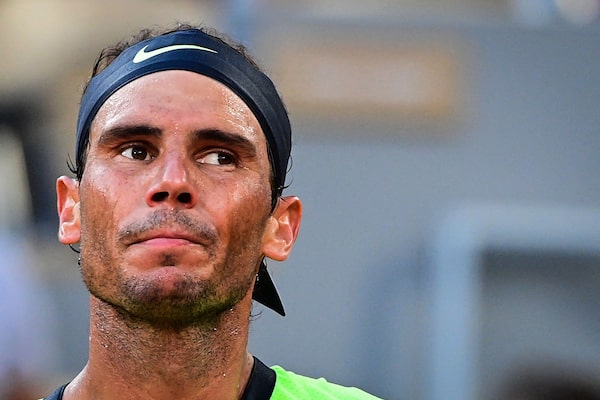
Rafael Nadal during his semi-final match against Novak Djokovic at the French Open, on June 11.MARTIN BUREAU/AFP/Getty Images
Rafael Nadal announced Friday that he was withdrawing from this year’s U.S. Open and would miss the rest of the 2021 season because of the chronic left-foot condition that has troubled him intermittently since his teens.
“I have been suffering too much with my foot for the last year now,” Nadal said in a video posted on social media.
Nadal, 35, a four-time U.S. Open champion, most recently won the singles title in New York in 2019. He defeated Daniil Medvedev in a five-set classic and then unusually broke down in tears courtside in his chair as he watched a commemorative video honouring his career.
But Nadal chose not to defend his title last year when the U.S. Open was played without spectators and with significant health restrictions in place because of the coronavirus pandemic.
This year, after losing in the semi-finals of the French Open to Novak Djokovic, Nadal did not play at Wimbledon or the Olympics as he tried to resolve his foot problem. He returned to action in Washington this month, but his movement was clearly still affected by the injury as he defeated Jack Sock in his opening match and then lost to Lloyd Harris in the next round. Nadal travelled to Toronto but withdrew from the Masters 1000 event there and returned home to Spain to weigh his options.
“I needed to talk with my family, with my team and with my doctors especially to understand what is going on,” the fourth-ranked Nadal said Friday. “But the foot is not the proper way today and during the last year I was not able to practise and prepare myself the way I need to to be competitive at the standard I want to be. So we had to take that decision, but I am confident that I will recover myself 100 per cent and I will be able to fight again for the most important things.”
Nadal’s left-foot condition first hampered him on tour during the 2004 season when he was 17 years old, forcing him to miss much of the clay court season. That delayed his debut at the French Open to 2005, when he won the first of his record 13 singles titles at Roland Garros.
But Nadal’s foot began troubling him again in October, 2005, at the Madrid Open. He has explained that doctors determined it was a congenital problem: a deformation of a small bone in his foot. He was also told that he might not play professional tennis again. But at 19, Nadal found a way to reduce the stress on the bone with custom-made insoles and returned to action in 2006, winning five titles, including the French Open.
“The injury is nothing new,” Nadal said Friday. “It’s the same injury I am having since 2005. In that moment, the doctors were very negative about my future career, but honestly I was able to have a career that I never dreamed about, so I am confident I will recover again and if the foot is better I am content my tennis and mentality will be there again soon. You can be sure I am going to fight every single day to make that happen.”
Nadal’s withdrawal means that for the second straight year, he and Roger Federer will miss the U.S. Open. Federer, 40, announced last week that he would miss the rest of the 2021 season and would need a fourth knee surgery. Dominic Thiem, who won the U.S. Open last year, has a right wrist injury and is also out for the remainder of the season.
The longtime rivals Nadal, Federer and Djokovic have each won 20 Grand Slam singles titles, sharing the men’s record. But Djokovic will chase his 21st alone in New York if he is able to recover from the shoulder injury that caused him to withdraw from the bronze medal mixed doubles match at the Olympics in Tokyo.
Djokovic will also be trying to complete the first Grand Slam in men’s singles since Rod Laver managed it in 1969. Djokovic has won the first three legs of the Grand Slam this year: the Australian Open, French Open and Wimbledon.